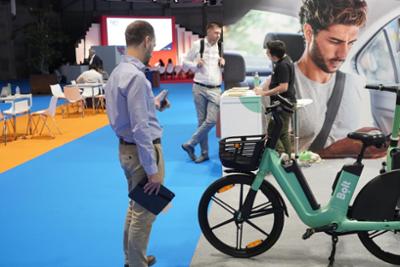

Cycling is on the verge of becoming a sustainable mode of transport, with an increasing number of the public making the most of it

One of Global Mobility Call’s key topics, taking place from 19 to 21 November at IFEMA MADRID, will be to make efforts to advance cycling.
Bicycles are widely accepted as a sustainable form of transport, essential for urban areas and their inhabitants. However, there are still obstacles to their wider use in several countries, mainly in terms of infrastructure and road safety.
The Global Mobility Call, the largest event of its kind, brings together public, business and industry leaders to discuss the future of sustainable mobility. One of the main topics on the agenda is the process to further advance cycling as sustainable transport in Spain and the rest of the world.
The event’s third year organised by IFEMA MADRID and Smobhub will take place from 19 to 21 November. The analysis of the bicycle will review the advances, obstacles and advantages presented by this process for people and cities.
Cycling Challenges and Opportunities
One of the main challenges is infrastructure. While many cities have built bike lanes and car parks, this is still insufficient. In Spain’s case, there is still a long way to go to match more developed European cities such as Copenhagen, Amsterdam and others.
The lack of a continuous and safer network of cycle lanes, the lack of awareness of motor vehicle drivers, poor signage and the poor quality of some infrastructure are factors that many people perceive as high risk, which in turn discourages potential cyclists.
Other challenges include the need to consolidate bike-sharing systems in cities, and to raise awareness of the benefits of cycling as a mode of transport, as well as a leisure and sporting activity. It is important to recognise that cycling is a necessity for people to move around cities.
These opportunities contribute to the reduction of pollutant emissions and the consequent improvement of city air quality. Furthermore, their use has a direct impact on public health, encouraging people to be more physically active and reducing cardiovascular diseases, obesity, and other related conditions.
High Social Acceptance of Cycling
Another significant opportunity for the advancement of bicycle-based sustainable transport is the high social acceptance it enjoys in Spain. This was evidenced in an opinion study conducted in 2023 and presented at the Global Mobility Call’s second year.
The survey conducted by Ipsos on behalf of the Spanish government, which involved 1,200 interviews with the public, revealed that six out of ten respondents own a bicycle. It is the fourth most used form of transport, and seven out of ten people expressed a desire to use it more often. The survey revealed that 33% of respondents have used bike-sharing services. A significant proportion of respondents (77%) have requested that their local councils facilitate the implementation of bike-sharing schemes. Furthermore, 60% of those interviewed indicated that with enhanced infrastructure and safety measures in place, they would be more inclined to use this transport mode.
At the survey’s presentation, Artur Munne, Head of Business in Spain at Fifteen, a bicycle network operator, stated that these data indicate that there are obstacles that can be overcome in the coming years, thus enabling the creation of a "public habit of using bicycles" soon.
Laura Vergara Román, manager of the Coordinadora en Defensa de la Bici, Conbici, emphasised the importance of modifying traffic regulations and establishing the Sustainable Mobility Law as a legal framework to enhance bicycle safety and usage. For Ruth Lamas Borraz, technical coordinator of Red de Ciudades por la Bicicleta, it is crucial to highlight that this is a cost-effective mode of transportation that is beneficial to local economies.
Jesús Freire, Secretary General of the Association of Brands and Bicycles of Spain (AMBE), has stated that people want to move more by bicycle despite the insecurity they perceive is an invitation to public administrations to invest in bike-sharing infrastructures and remove the idea that there is a mobility war.
Jaime Ruiz Huescar, co-founder of Cities Forum, believes that the issue is not simply one of creating cycle lanes. Rather, it is about understanding the bicycle as a convenient vehicle for people, and that there is a culture of its use that takes time to consolidate. This can only be achieved through alliances between city councils, the public and companies.





